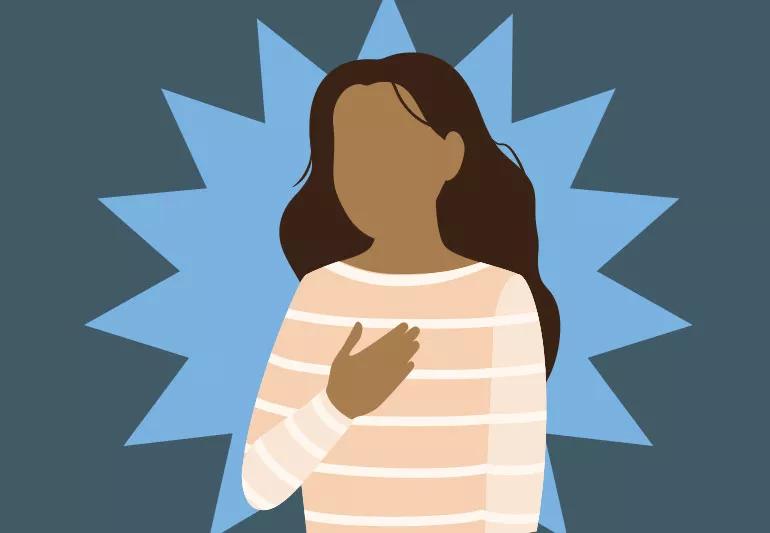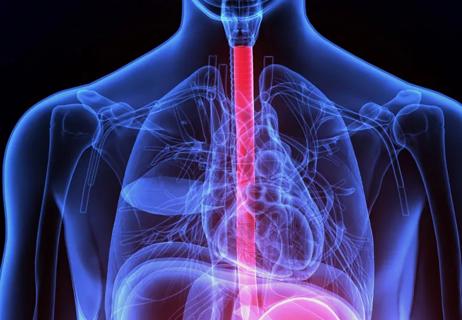Not all chest discomfort is a symptom of a heart attack

Heart attacks are no joke — in the U.S., they happen every 40 seconds, with about 805,000 heart attacks occurring every year. But just how do you know when that chest pain you feel is actually a heart attack and not something else entirely?
Advertisement
Cleveland Clinic is a non-profit academic medical center. Advertising on our site helps support our mission. We do not endorse non-Cleveland Clinic products or services. Policy
The answer, says cardiologist Curtis Rimmerman, MD, is knowing that your pain is sudden, persistent and not pinpointed to one location. But even if you’re unsure, if you’re at higher risk for a heart attack, any chest pain deserves immediate attention.
“When in doubt, err on the side of caution and visit a doctor or emergency room immediately,” advises Dr. Rimmerman.
You may be wondering why your chest is hurting if you have pain on the right side or middle of your chest and whether it’s a sign of a heart attack. In truth, the location of your chest pain matters less — especially if it’s pinpoint pain the size of a dime or quarter in a specific, localized area of your chest.
“When you’re trying to distinguish whether or not it’s a heart attack, location is overrated,” says Dr. Rimmerman. “You should never put too much value into location because you could lose functioning heart muscle the longer you wait to figure out what’s causing your pain.”
Some people have what’s called “silent heart attacks,” where they don’t experience any pain at all. But those who do experience pain during a heart attack can feel it anywhere in their chest, typically across an area roughly the size of their fist or larger.
Advertisement
It’s also important to note that if you’re having a heart attack, you can also experience referred pain in other areas of your body that include your:
“Location is only one factor in determining if it’s cardiac or not,” notes Dr. Rimmerman.
Heart attack-related chest pain tends to come on suddenly and doesn’t go away on its own — and as you can see from above, heart attacks can affect far more than your chest. Serious heart attack-related pain often comes with other symptoms that include:
“It’s almost as if there is a balloon inside your chest that is expanding — not something coming from the outside in,” Dr. Rimmerman explains. “This pain can come and go a little bit, but it will be persistent and have more of a crescendo pattern to it. Oftentimes, it’s an unrelenting intense pressure or heaviness and not a distinct pain.”
If this feeling or any of these symptoms lasts longer than a few minutes, you should call 911 or your local emergency services and seek medical attention immediately.
“If you’ve been smoking long-term, if you have diabetes, high blood pressure, high cholesterol or a very prominent family history of heart disease (coronary artery disease), these all increase the odds that this new, significant chest discomfort you feel is related to your heart,” Dr. Rimmerman adds.
Sometimes, chest pain doesn’t signal a heart attack. A study of emergency room visits found that less than 6% of people arriving with chest pain had a life-threatening heart issue. That doesn’t necessarily mean there’s no cause for alarm, but there are ways to exclude a heart attack if you’re not at high risk for having one.
You’re likely not having a heart attack if:
If you have sudden, sharp, momentary chest discomfort that lasts fewer than a couple minutes, it could result from:
If you have a piercing pain in your chest that gets worse when you move around or take deep breaths, it’s not likely a heart attack, but it could be a lung-related issue caused by a number of conditions, including:
Advertisement
And while these lung issues aren’t heart attacks, they’re concerning enough to warrant a call to a healthcare provider or a visit to an emergency room if symptoms don’t go away on their own or grow worse.
If a sharp pain strikes your chest but improves as you move around a bit, you may be looking at a case of heartburn (acid reflux) or some other gastrointestinal issue. An estimated 15 million Americans a day experience heartburn, which brings an uncomfortable burning feeling in your chest and may be accompanied by a sour feeling in your throat. An over-the-counter antacid can help bring some relief.
But again: It’s easy to confuse heartburn with a heart attack and it’s better to ask for help than wait if you’re experiencing this pain for the very first time.
“It’s important to take personal inventory of your risk factors and not ascribe the pain you’re feeling to pre-existing or new heartburn,” advises Dr. Rimmerman. “If you’re at higher risk for a heart attack or have a family history of heart attacks, you should default to the most serious, potential problem of a heart attack, and seek medical help just to be safe.”
Advertisement
Dr. Rimmerman emphasizes that the early symptoms of heart attack can be different from person to person. Some people experience no symptoms. Others experience crushing chest pain. Others may feel only arm, throat or jaw discomfort. But the discomfort is usually unrelenting and typically lasts five minutes or more.
“Regardless of where the pain is, people typically can’t find a position that relieves the pain,” he says. “Nor do they find relief by taking a drink of water, popping antacids or taking deep breaths.”
And that means it’s time to call 911.
Advertisement

Sign up for our Health Essentials emails for expert guidance on nutrition, fitness, sleep, skin care and more.
Learn more about our editorial process.
Advertisement

From heartburn and panic attacks to muscle spasms and heart attacks, lots of medical conditions can cause chest pain

If you have other cardiac symptoms, and antacids aren’t working, it’s time to call emergency services

Feelings of stress or anxiety can cause an increase in hormones and a tightening of the chest muscles, which can lead to chest pain

If your provider has ruled out a serious cause, you can treat chest pain at home with antacids, inhalers or anti-inflammatory medications

Don’t ignore chest pressure that lingers and can’t be explained

Why the condition, also called jackhammer esophagus, is missed

Certain supplements, like licorice root and St. John’s wort, can raise your blood pressure or negatively interact with medication

No, but it momentarily slows down during this involuntary body function

Even small moments of time outdoors can help reduce stress, boost mood and restore a sense of calm

A correct prescription helps your eyes see clearly — but as natural changes occur, you may need stronger or different eyeglasses

Both are medical emergencies, but they are very distinct events with different causes